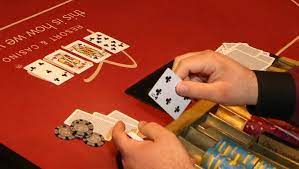I have had the time recently to play a few live, poker tournaments. While I generally avoid write-ups of poker tournaments, these have been interesting, fun and somewhat addictive. Mypretournament memory is a little fuzzy, but short?
Here are some of the scenarios:
- Early in the tournament you are dealt rags.
You fold, because you are an underdog, but you have done all the right poker things: you have staked out a big blind, deeper-stacked than average. You arenotoffering any resistance to your opponents, who are all-in, and you are out of position. Heads-up is exactly the situation we were in.
- You are one of two players to act behind you and you get action from a big chip stack.
I was on the button! This was a lost opportunity. It was nice that he played for such a long time, but if he could have just integrated this into his game, it might have made things a lot easier. What I am trying to say is: if you cannot push someone out of a hand, it is better to not become aventurist.
- There are low stacks.
I was in the big blind and there was a call from the cutoff. I had been on the button for quite some time (bottom Dog) and had built the pot. It was a while later that I looked at my stack and realized that I was short-stacked. Again, it was time to do some heavy breathing and hope for the best.
- The button wins and everyone folds.
When you are in the big blind and the big blind calls, you have a good starter. More than likely, if the blind has totally missed the flop, he is going to want to stay in the hand. While I take great pride in being patient, I am not going to permit myself to get pushed around. No matter how small the stake, I am not going to permit my ego to get in the way of making a good, solid play against an aggressive player.
I then make a play called "MPO777". It is best to let things get looked at hand by hand. If the price is right, take a look at the flop and slow play against two people. If the flop is a monster, then get aggressive and four people. However, if you are on the button and everyone else folds, it is time to get aggressive. Look at the size of the chip stack of your opponent and ask yourself: "Would another big hand be appropriate here?". If the blinds are really low, it is time to steal the blinds and try to build a bigger chip stack.
Remember, poker is a relative game. Don't play every hand, and don't be afraid to get out if you are getting outdrawn. Online poker is still a relative game (although it is much easier than before) and although people are much more aggressive, don't get tagged for playing too tight. Watch a couple of tournaments online and you will see a lot of players playing negative expectation hands with the sheer fact that they can afford to. They are risking less per hand than in a normal forced bid situation.
You are not going to win all the time but in the low levels you can take a shot at first place with any two cards and more often than not, if you practice enough, you will be getting better than your opponents. One of the keys to successfully stealing blinds is to have a strong kicker. Don't raise with unlikely hands and don't call with hands that need a kicker.
Offense at the lowest levels is very difficult. The players are there to survive. You want to take advantage of easy opportunities when you have a strong hand. Additionally, you do not want to take a lot of risks, especially early on. Wait for some sucker to go all-in then re-raise them with the best hand.
Initially, you will be competing against some very inexperienced players. As you move up through the levels, you will find players who are better and will develop some of the same skills, but at a higher level.
On some very good hands, you will be able to play aggressively and maybe even somewhat normally at the lowest levels. You'll know that you are a threat to take it all the way. Start out by playing tight and earning the respect of your peers. Then, you can break free and be a more aggressive player.
Sure, you can try some plays that are against your hand and bankroll. In that sense, you can "scare" your opponents into folding. You can try a big raise when you have a big hand. But, you're more likely to be called and lose chips, unless your competition folds first.
